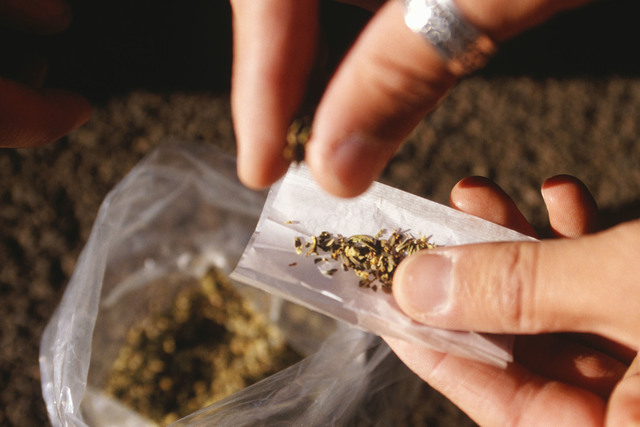More incidents of workplace pot use reported after legalization in Colorado, expert says
CARSON CITY — A marijuana expert from Colorado told business leaders Friday that after that state legalized recreational use of the drug in 2012, workplace incidents of employees under the influence rose from 6 percent to 20 percent in the following year.
The increase was based on data provided by one drug testing company, said Jo McGuire, director of compliance and corporate training for a drug testing company in Colorado Springs.
“Employers are not doing a good job — Colorado is not doing a good job — of explaining that workplace drug use is not OK,” McGuire told several dozen attendees at a Carson City Chamber of Commerce event. “It is not safe.”
McGuire was asked to speak about recreational marijuana use and the workplace because of Question 2 on the November general election ballot, which addresses legalizing recreational marijuana use in Nevada. Nevadans would be able to possess 1 ounce or less of marijuana legally under state law starting Jan. 1 if voters approve the measure.
Colorado and Washington were the first states to legalize recreational marijuana use in 2012.
Absenteeism, workplace injuries, workplace theft to support a drug habit and the sale of drugs by one employee to another are all issues employers face because of illicit drug use, McGuire said.
Nevada employers need to know the state laws about marijuana use, their rights as employers and the implications for such programs as workers’ compensation, she said.
State Sen. Tick Segerblom, D-Las Vegas, said the employer-employee issue will have to be addressed if Question 2 passes.
“If employers do testing without an objective look at whether someone is actually under the influence, they will lose a lot of good employees,” he said.
Segerblom pushed Nevada’s medical marijuana dispensary law through the Legislature in 2013.
Zero tolerance for drug use in the workplace is legal in Nevada, but such a standard for responsible marijuana users could end up excluding “some of the most productive, smartest, hardworking people out there,” he said.
McGuire said all employers should have a clearly written drug and alcohol policy that is communicated to employees.
In Colorado, companies with clear zero tolerance policies have been winning in court when employees have legally challenged marijuana-use-related dismissals, she said.
Colorado’s marijuana law clearly says that it doesn’t require an employer to permit or accommodate the use of marijuana in the workplace, but there are efforts around the country to erode those standards, McGuire said.
Contact Sean Whaley at swhaley@reviewjournal.com or 775-461-3820. Find him on Twitter: @seanw801
RELATED
Veterans say marijuana helps ease PTSD, pain
Colorado may raise pot limits for tourists






















